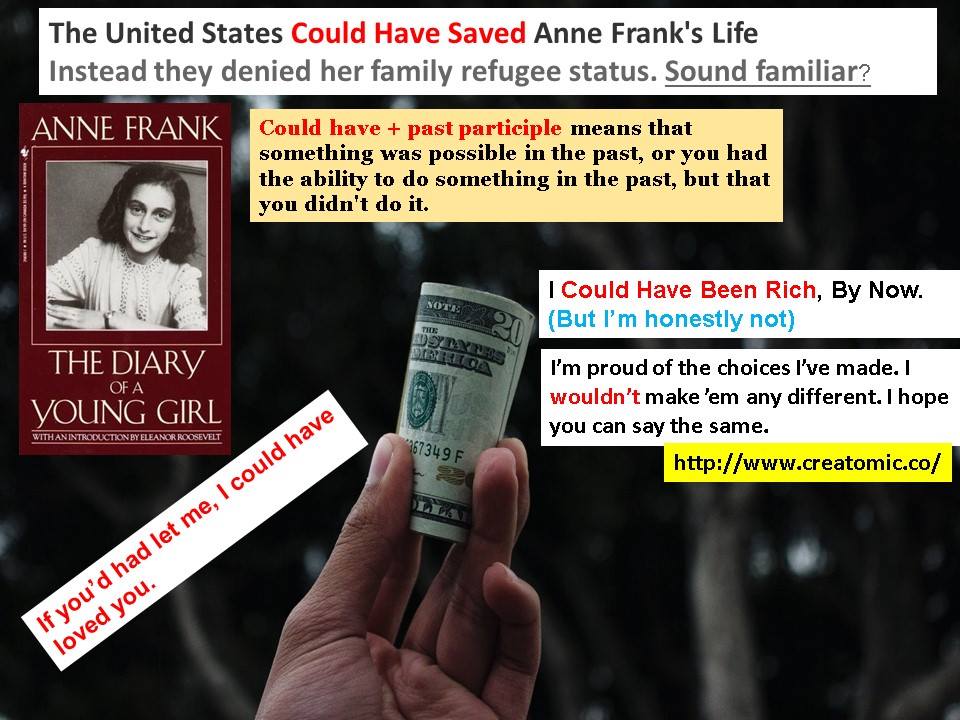past modals

- must have + p.
Æ a deduction about something that has happened.
Example: If your mobile isn’t in your bag, you must have left it in the house.
- can’t / couldn’t have + p.
Æ a deduction about something that didn’t happen in the past.
Example: I can’t have lost my wallet! (I’m sure I didn’t)
She couldn’t have said that!
- could /may /may not/ might have / might have not + p.
Æ something was possible but it didn’t happen.
Æ it was possible that something happened in the past (but we are not 100% sure).
Example: I could have passed my English test if I’d studied harder
He may have / may not have missed the bus.
The assistant might / might not have received her message.
- should have + p.
- something was positive or needed, but did not take place.
Æ it was possible that something happened in the past (but we are not 100% sure).
Example: I should have phoned my sister last night, but I forgot. (I needed to phone my sister but I didn’t phone her)
John should have received the letter.
- shouldn’t have + p.
Æ something did take place but that wasn’t positive or needed:
Example: You shouldn’t have eaten so many sweets, you’ll be sick. (You ate a lot of sweets and it wasn’t a good idea)
- needn’t have + p.
Æ something was done, but that it was not necessary.
Example: Oh, you needn’t have done the washing up! (we’ve got a washing machine)
Exercise. Complete the sentences with a suitable modal verb in the past More than a solution is sometimes possible.
- Jack passed his exam with a good mark. He ______________________ (study) very hard.
- We found the exam very easy. We ______________________ (study) so hard.
- Robert failed his exam. He ______________________ (study) much.
- We ______________________ (hurry). We got there far too early.
- Meg’s looking very happy. She ______________________ (get) the prize she wanted.
- I can’t find my glasses anywhere. I ______________________ (leave) them on the train.
- Kate ______________________ (go) to Mary’s house.
- He was standing right next to you. You ______________________ (miss) him.
- He was here a moment ago. He ______________________ (go) far.
- He went to Alaska on holiday. It ______________________ (be) very cold.
- Jerry’s late. He ______________________ (miss) the bus.
- Jessica ______________________ (tell) lies.
- You ______________________ (phone) to say you were late. I’ve been waiting for hours.
- I’m so happy they didn’t find the safe. They ______________________ (take) everything.
- The thieves ______________________ (get) into the house through the window. It’s broken.
- You ______________________ (tell) me you were vegetarian. I’ve prepared lamb.
- Jason ______________________ (be) a professional tennis player but he wasn’t interested.
- You ______________________ (lose) your keys. We used them to open the door.
- Tony ______________________ (catch) the plane. He had plenty of time.
- My mum ______________________ (forget) to lock the door when she went out.
- You must be dreaming. You ______________________ (see) a puma in our garden.
22.They ______________________ (wait) outside until it was dark because nobody saw them.
- You ______________________ (come) to the station. I could have got a taxi.
- You should keep your dog on a lead! It ______________________ (cause) an accident.
- He ______________________ (receive) the fax. We sent it half an hour ago.
KEY:
- must have studied
- needn’t have studied
- should have studied
- needn’t have hurried
- must have got
- must have left
- can / may / might / have gone
- can’t have missed
- can’t have gone
- must have been
- must have missed
- shouldn’t have told
- could / might have phoned
- could / may / might have taken
- must have got
- might have told
- could / might have been
- can’t / couldn’t have lost
- should have caught
- could / may / might have forgotten
- can’t have seen
- must have waited
- needn’t have come
- might have caused
- should / must have recived
